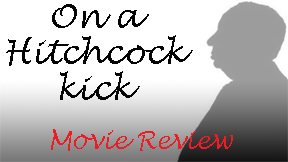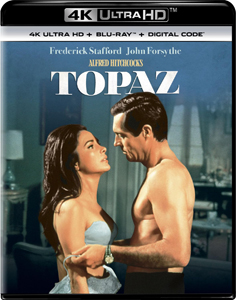Alfred Hitchcock often talked about how maguffins need not be defined; the audience just has to know it is important to the characters, and therefore we are invested. That’s true, but I often wondered: If a maguffin – and a plot, to extend the issue further – has deeper meaning, then could that make a movie even richer?
A few times in his career, Hitchcock did indeed experiment with the idea of a suspense film having meaning beyond the ride itself, usually in international political thrillers. In “Foreign Correspondent” (1940), the ride takes us through a doppelganger for an important figure, and ultimately Hitchcock makes an argument that America should enter World War II.
In “Torn Curtain” (1966), the journey includes an important book and a mysterious symbol, and ultimately we get a picture of the terror of living behind the Iron Curtain. Despite its impact on that count, that film is messy enough to rank as a mid-range Hitchcock, and audiences might’ve been weary when he followed it up with another international spy thriller, “Topaz” (1969).

“Topaz” (1969)
Director: Alfred Hitchcock
Writers: Samuel A. Taylor (screenplay), Leon Uris (novel)
Stars: Frederick Stafford, Dany Robin, John Vernon
Real-world importance
But “Topaz” – quickly turned around from Leon Uris’ 1967 novel — is Hitchcock’s elite work in this genre due to the heft of the buildup to the 1962 Cuban Missile Crisis and the very human people who play roles. Viewed today, it’s a capsule of a time when spies truly had to be secretive, because governments believed the common man had some power to keep them in check. Unlike now, they didn’t brazenly announce that they had misplaced billions of dollars without worrying about repercussions.
This is screenwriter Samuel A. Taylor’s only collaboration with the master other than Hitch’s very best film, 1958’s “Vertigo,” so it’s not a slight to say “Topaz” is not at that level. But it’s very good. I don’t like convoluted international spy thrillers as a general rule, but this one kept me engrossed.
Taylor’s plotting hits that sweet spot between confusing and simple; we can follow it, yet every person’s secretive actions make logical or emotional sense. Taylor keeps things personal, even though the focus alternates, and even though Hitch and his team keep the genre trappings of suited bureaucrats and long-tabled boardrooms. Yes, this is the type of film where someone already wearing an impeccable suit will announce that he has to change for dinner.
Humanity not lost in the plot
We start in Denmark with a Russian diplomatic family aiming to defect to America. They must go through convoluted steps, pretending to hit tourist stops in Copenhagen, to evade a Russian agent watching them. Our first sympathetic, audience-surrogate figure is the Kusenov daughter (Tina Hedstrom), traumatized by her narrow escape and desiring to start a better life in America.

Our American spy-games protagonist is Michael Nordstrom (John Forsythe). But practically speaking, “Topaz’s” hero is Nordstrom’s friend, Frenchman Andre Devereaux (Frederick Stafford) – and he’s quite a good hero.
First, “Topaz” has to “create” the maguffin – images of the Cubans bringing in Russian missiles at a port – and that itself leads to suspense, plus harrowing images of a sweet-natured low-level spy couple after they have been tortured by the Cuban baddie, Rico Parra (John Vernon).
When we get to the point of Andre trying to get those tiny filmstrips back to his American allies, yes, the strips function the same as a maguffin, but they have personal and historical weight. We care about these characters who paid with their lives, and about the real-world fact of the Cuban Missile Crisis.
It sounds like I’m describing a more “important” film than one where the fun comes first – like the crowd-pleasing “North by Northwest,” also technically a spy thriller. And indeed I am. “Topaz” is among Hitchcock’s most humor-free films. Not a single moment is played for laughs, and we feel for those Cuban citizens like we did for the poor old lookalike in the censorious, lighter-touch age of “Foreign Correspondent.”
Dry but not dour
Yet the movie isn’t a dour experience. Even though “Topaz” is an astounding 2 hours and 22 minutes long, it’s not plodding. It’s propulsive because – even though we keep focusing on new people, in new cities, with new aims – we always are interested in them.
Like most Hitch pictures, rear-projection and compositing are used rather than location shooting, and that’s always a minor shame. But this is a story piece, originated by Uris, sharpened by Taylor and executed with precision by Hitchcock.
As noted, it has the weight of the real Cuban Missile Crisis behind it, and it does depend on the audience having a general knowledge of how JFK would follow these events with further diplomatic skill to defuse the situation.
Maybe “Topaz” is overlooked because it doesn’t have thematic heft like Hitchcock’s lauded films. As he got older, Hitch realized you can’t make enough sense of the world to make universal moral statements. (One could argue that the lack of a statement is itself a statement about the world’s nihilistic nature, but that’s for a deeper essay.)
I’m just happy that when I watch this third-to-last Hitchcock film, it makes plot and character sense, and that I care for all 2 hours-plus. Dry it may be, but “Topaz” is a hidden gem.
RFMC’s Alfred Hitchcock series reviews works by the Master of Suspense, plus remakes and source material. Click here to visit our Hitchcock Zone.

